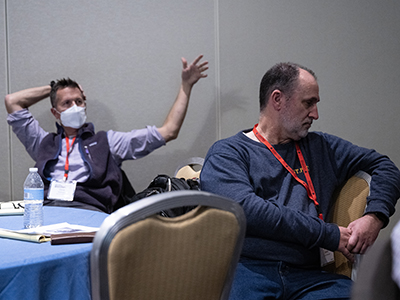The awards ceremony is one of the happiest events of the AHA’s annual calendar,” AHA president Edward Muir said in his introduction to the ceremony on the evening of January 4, 2024, at the annual meeting in San Francisco. Muir is correct—a perennially well-attended event, historians and their families, friends, and colleagues gather each year to celebrate the recipients of the more than three dozen prizes and awards conferred by the AHA. What most people don’t see is all the work leading up to that hour-long ceremony—more than 100 volunteer committee members, supported by AHA staff, work for months to collect and review nominations, announce prizewinners, and, finally, honor the recipients at the annual meeting.
The awards cycle begins early in the year, when AHA staff contact prize committee members to prepare them for their upcoming task. While some AHA awardees are selected by the AHA’s elected Council, the majority are decided by these committees, each composed of three to five AHA members nominated by the Committee on Committees (ConC) and approved by the Council. “The ConC members take into account the needs of the next year’s committee in terms of area of specialization or other factors specific to that prize,” explained Liz Townsend, the AHA’s manager, data administration and integrity, and staff liaison to the ConC. After the ConC has identified their nominees, Liz contacts each to ask whether they would be willing to serve. “If the answer is no, we move on to the next name on the list. If the answer is yes, we’re very grateful!”
May 15 is the deadline each year for award nominees. Then committees spend the summer reviewing submissions and deliberating. This process is different for each award. Committees for professional and teaching prizes review packets for nominees to determine which candidate best fits the criteria for the award. For publications awards, committees may review a few dozen to more than 150 submissions, usually in the form of full-length books. Throughout this process, operations and communications assistant Rebecca West serves as the committees’ point person at the AHA, answering questions about policy and procedure, tracking down missing review copies, and helping with any other issues that arise.
Most committees must submit their prizewinner and a short paragraph describing their choice by September 15. (The committee for the John E. O’Connor Film Award is on a tighter schedule—theirs is due August 15, which allows Rebecca to coordinate a film screening at the annual meeting with the winning filmmakers.) Committee members are asked to keep their selections under wraps until the winners are announced in October.
Once the winners are chosen, Rebecca and Liz operate on a series of tight deadlines. They notify the winners (and for publications, their publishers) via email; compile a short online announcement for Perspectives Daily and the longer print announcement for the December issue of Perspectives on History; remit cash awards to the prizewinners who receive them; print and emboss the awards certificates; create the awards ceremony program, presentation, and signage for the annual meeting; and work with the AHA president and president-elect on the script for the ceremony. They also oversee the transition of the awards committees, thanking members who have completed their terms of service and working with the remaining members to appoint a committee chair for the following year.
All this work culminates in early January at that happy event, the awards ceremony. Once the AHA staff return from the meeting, Rebecca mails certificates and ceremony programs to any awardees who couldn’t attend, and she and Liz begin coordinating with the incoming prize committees to do it all over again.
Rebecca L. West is operations and communications assistant at the AHA. Find her on X (formerly Twitter) @rebeckawest.
Tags: AHA Activities Behind the Scenes at the AHA

This work is licensed under a Creative Commons Attribution-NonCommercial-NoDerivatives 4.0 International License. Attribution must provide author name, article title, Perspectives on History, date of publication, and a link to this page. This license applies only to the article, not to text or images used here by permission.
The American Historical Association welcomes comments in the discussion area below, at AHA Communities, and in letters to the editor. Please read our commenting and letters policy before submitting.
Comment
Please read our commenting and letters policy before submitting.










